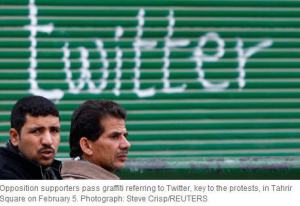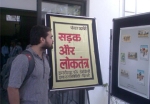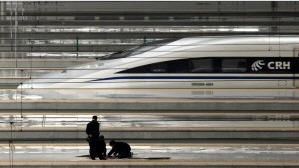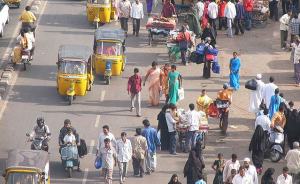* * * Click here for Weekly Edition of 28 February 2011 * * * 
- – - > To receive the Weekly Editions freely in 2011 please click here
--> Read on:
Insights and contributions from leading thinkers & practitioners around the world
* * * Click here for Weekly Edition of 28 February 2011 * * * 
- – - > To receive the Weekly Editions freely in 2011 please click here
We try very hard to stay on topic in World Streets, not always easy since our bailiwick is so vast. But there are times when, if we are to do our self-assigned job, we need to look even broader yet. One of the fundamental tenets of World Streets is that the decisions that in the past have shaped the streets and mobility arrangements of our cities now have to be sharply revised and brought into the realities of this very different 21st century. In the past the shaping decisions and investments in the sector were made in more or less closed committees manned (I chose my word carefully) by a very narrow range of social-economic groups (mainly more or less educated males, with secure jobs, fast cars and fat pensions). With the utterly unsurprising results that the mobility system they ordered up was the one that served them best: i.e., lots of roads for fast driving, cheap gas, and plenty of free places to park. Bien sûr mon ami.
One of the fundamental tenets of World Streets is that the decisions that in the past have shaped the streets and mobility arrangements of our cities now have to be sharply revised and brought into the realities of this very different 21st century. In the past the shaping decisions and investments in the sector were made in more or less closed committees manned (I chose my word carefully) by a very narrow range of social-economic groups (mainly more or less educated males, with secure jobs, fast cars and fat pensions). With the utterly unsurprising results that the mobility system they ordered up was the one that served them best: i.e., lots of roads for fast driving, cheap gas, and plenty of free places to park. Bien sûr mon ami.
Sometimes in life things can be simple. Let's look at one case. Doubtless the most severe single problem holding us back in the hard up-hill struggle for "sustainable transport" in cities and countries around the world is that so far everyone seems to have a different definition and a different agenda. Google offered 947,000 entries under this phrase this morning and all it takes is a quick tour of the Google News rubric to get a quick education on the enormous range of interpretations of what the phrase means to different people, places and interests.
Doubtless the most severe single problem holding us back in the hard up-hill struggle for "sustainable transport" in cities and countries around the world is that so far everyone seems to have a different definition and a different agenda. Google offered 947,000 entries under this phrase this morning and all it takes is a quick tour of the Google News rubric to get a quick education on the enormous range of interpretations of what the phrase means to different people, places and interests.
This is a personal call to those of you who have over the years participated in the rather  numerous programs and working groups we have since 1988 carefully crafted and maintained in support of worldwide peer collaboration and exchange in our tough but important field: under the New Mobility Agenda, World Streets or one of its sister publications (see below), or who have of late plugged in to our pages on Facebook or Twitter. I feel pretty quite comfortable in doing this since you know what we are trying to do, and who better for me to turn to at a time of need. (And oh yes, for those who may not recall, that citation above was by Nobel Prize winner Professor Ernest Rutherford, on taking over the quite broke Cavendish Laboratory in 1919, in the wake of the First World War.)
numerous programs and working groups we have since 1988 carefully crafted and maintained in support of worldwide peer collaboration and exchange in our tough but important field: under the New Mobility Agenda, World Streets or one of its sister publications (see below), or who have of late plugged in to our pages on Facebook or Twitter. I feel pretty quite comfortable in doing this since you know what we are trying to do, and who better for me to turn to at a time of need. (And oh yes, for those who may not recall, that citation above was by Nobel Prize winner Professor Ernest Rutherford, on taking over the quite broke Cavendish Laboratory in 1919, in the wake of the First World War.)
Gladwyn d'Souza comments from California an article that has just appeared in the New York Times on this subject.  "The United States Environmental Protections Agency, EPA, should really be discussing the allocation of risk. A large curb radius for example transfers risk from the speeding driver to the pedestrian. The issue is that speed and convenience embody an energy bill whose consequences are not repatriated on the basis of least harm to public safety. While the consequences are local, an injury on your street corner, the impact under NAFTA, etc., of comparative or qualitative instead of preventive risk assessment is habitat destructive. . . . "
"The United States Environmental Protections Agency, EPA, should really be discussing the allocation of risk. A large curb radius for example transfers risk from the speeding driver to the pedestrian. The issue is that speed and convenience embody an energy bill whose consequences are not repatriated on the basis of least harm to public safety. While the consequences are local, an injury on your street corner, the impact under NAFTA, etc., of comparative or qualitative instead of preventive risk assessment is habitat destructive. . . . "
Parisar has recently completed two detailed studies on the metro rail proposal for Pune. The first was a preliminary analysis of whether Pune needs a metro rail system and the second analyzed in detail the decision-making processes in approving Pune's metro rail proposal as well as the detailed project report (DPR) of the metro rail proposal. The preliminary analysis of whether Pune needs a metro rail system was based on secondary data from three … Read More
 What's happening on the new mobility scene in France in 2011? Here you have, in French but with good subtitles, an interview by one of the outstanding political innovators in the field of sustainable transport policy and practice in France. Roland Ries is serving his second term as mayor of Strasburg, and at the same time heads up the national transport political group GART. He also, by the way, as a member of the French Senate drafted the law defining carsharing in France, thus opening up a part of the way to more and better carsharing nation-wide. Spend three minutes with this short video to get a feel for what the leading edge in France is thinking and doing about transport in cities. You will quickly see that this is a world-level message. Play it for your mayor and talk to her about it.
What's happening on the new mobility scene in France in 2011? Here you have, in French but with good subtitles, an interview by one of the outstanding political innovators in the field of sustainable transport policy and practice in France. Roland Ries is serving his second term as mayor of Strasburg, and at the same time heads up the national transport political group GART. He also, by the way, as a member of the French Senate drafted the law defining carsharing in France, thus opening up a part of the way to more and better carsharing nation-wide. Spend three minutes with this short video to get a feel for what the leading edge in France is thinking and doing about transport in cities. You will quickly see that this is a world-level message. Play it for your mayor and talk to her about it.
 While Paris and London hog the world’s media attention with Boris’ Bikes and the Velib, by some accounts the Chinese city of Hangzhou now boasts the world’s largest and most used public shared bicycle system. Rory McMullan, contributing editor, reports on his impressions of the city, its transport network and the public bike system from an on-street carbon-free visit during the Chinese New Year.
While Paris and London hog the world’s media attention with Boris’ Bikes and the Velib, by some accounts the Chinese city of Hangzhou now boasts the world’s largest and most used public shared bicycle system. Rory McMullan, contributing editor, reports on his impressions of the city, its transport network and the public bike system from an on-street carbon-free visit during the Chinese New Year.
The Swedish government's annual instructions to the National Transport Administration now include a mission to support and improve conditions for virtual meetings across the  country. The goal is to find practical ways to harness "Green IT" as an efficient travel substitute as well as to provide both more efficient management and reduced environmental impacts. The core proposal is based on a “ten step method” which the Administration released last year to champion and support virtual meetings within an organization. The project behind this strategy is introduced here. And you are warmly invited to comment and share the fruit of your own experiences.
country. The goal is to find practical ways to harness "Green IT" as an efficient travel substitute as well as to provide both more efficient management and reduced environmental impacts. The core proposal is based on a “ten step method” which the Administration released last year to champion and support virtual meetings within an organization. The project behind this strategy is introduced here. And you are warmly invited to comment and share the fruit of your own experiences.
 It might make some sense, in reviewing the potential of HS2, to take a few samplings on how the year-old HS1 domestic services are performing - or not. S N Barnes reports to World Streets from a crowded rail platform somewhere in the UK.
It might make some sense, in reviewing the potential of HS2, to take a few samplings on how the year-old HS1 domestic services are performing - or not. S N Barnes reports to World Streets from a crowded rail platform somewhere in the UK.
 How many times does the need for being pro-people, environmentally concerned, and context specific, in forming an urban transportation strategy need iteration? Simple - till the job gets done. We need to keep reminding city-building professionals, decision makers, politicos, and most importantly, ourselves - the people - of it, until i … Read More via India Streets
How many times does the need for being pro-people, environmentally concerned, and context specific, in forming an urban transportation strategy need iteration? Simple - till the job gets done. We need to keep reminding city-building professionals, decision makers, politicos, and most importantly, ourselves - the people - of it, until i … Read More via India Streets
Strange as it may seem when you do the basic arithmetic, there is strong support from the three main political parties in the UK for the  HSR proposal, and if our first article in this series argues that the reasoning behind it is heavily flawed, it is important in these matters to present the arguments of those who may not agree. Here you have some extensive extracts from a group, Greengauge 21, that have aggressively argued for the HSR proposal. We leave it to your attention. Beyond what you see here they have a more detailed leaflet outlining their arguments which you can have here - "HS2 — why the critics are wrong". And once again, we welcome your comments.
HSR proposal, and if our first article in this series argues that the reasoning behind it is heavily flawed, it is important in these matters to present the arguments of those who may not agree. Here you have some extensive extracts from a group, Greengauge 21, that have aggressively argued for the HSR proposal. We leave it to your attention. Beyond what you see here they have a more detailed leaflet outlining their arguments which you can have here - "HS2 — why the critics are wrong". And once again, we welcome your comments.
 In the field of transport, no matter how straight-forward the issues may seem to be to the busy citizen, merchant, reporter or policy maker, when it comes to making wise policy it really does take a certain level of time and attention to detail to come to grips with the underlying issues and priorities that shape the outcomes. The awful conundrum encumbering the mobility issues of our new century from a policy perspective is that just about everything turns out upon study to be unobligingly complex, interdependent, complicated and time lagged – no matter how simple it may appear to be on the surface. In the article that follows, the authors have a go at a lot of the too-easy thinking that is the main currency of the High Speed Rail discussions in places like Britain and the US, where the only experience with these technologies and operations has been that of a far-away time-lagged dream machine. Let's embrace a bit of complexity here.
In the field of transport, no matter how straight-forward the issues may seem to be to the busy citizen, merchant, reporter or policy maker, when it comes to making wise policy it really does take a certain level of time and attention to detail to come to grips with the underlying issues and priorities that shape the outcomes. The awful conundrum encumbering the mobility issues of our new century from a policy perspective is that just about everything turns out upon study to be unobligingly complex, interdependent, complicated and time lagged – no matter how simple it may appear to be on the surface. In the article that follows, the authors have a go at a lot of the too-easy thinking that is the main currency of the High Speed Rail discussions in places like Britain and the US, where the only experience with these technologies and operations has been that of a far-away time-lagged dream machine. Let's embrace a bit of complexity here.
The most significant accomplishment over this last year has been that World Streets has  somehow managed to continue publication on a weekly basis, and step by step to improve the journal and steadily build up our international readership and contributions. And all this really quite against the odds and with less than modicum of the necessary financial support. But good cause, high commitment and fair performance carry the day, with the result that each week anywhere from 700 to 2000 readers from more than fifty countries from all corners of the world come in to access the journal.
somehow managed to continue publication on a weekly basis, and step by step to improve the journal and steadily build up our international readership and contributions. And all this really quite against the odds and with less than modicum of the necessary financial support. But good cause, high commitment and fair performance carry the day, with the result that each week anywhere from 700 to 2000 readers from more than fifty countries from all corners of the world come in to access the journal.
World Streets Social Media/Networking Game Plan in Brief (Working notes) Target: Let's see if and how we can best select and apply a batch of hopefully synergistic available social media tools to extend readership, content and support for World Streets in 2011.
Target: Let's see if and how we can best select and apply a batch of hopefully synergistic available social media tools to extend readership, content and support for World Streets in 2011.
Our approach/Exec. Summary: Do it as well as we can/Inspect feedback/Adjust as we go along/Invite creative articles from colleagues working directly with these tools/Share all this with our readers.
 Question: Is there some way (or good reason) to integrate, link, make talk to each other usefully, whatever, the various social media to which we are trying to hook World Streets in some way. We at present have created two-way links (of sorts) between World Streets, Facebook, Twitter and LinkedIn. We are seeing some utility in the individual hookups (but not all that much thus far), however I am baffled when it comes to figuring out how to orchestrate them in some useful way. Are we wasting our time or is there a creative fit? And what might that be? Kind thanks for your thoughts and leads on this puzzling problem/opportunity.
Question: Is there some way (or good reason) to integrate, link, make talk to each other usefully, whatever, the various social media to which we are trying to hook World Streets in some way. We at present have created two-way links (of sorts) between World Streets, Facebook, Twitter and LinkedIn. We are seeing some utility in the individual hookups (but not all that much thus far), however I am baffled when it comes to figuring out how to orchestrate them in some useful way. Are we wasting our time or is there a creative fit? And what might that be? Kind thanks for your thoughts and leads on this puzzling problem/opportunity.
This just in from our fearless embedded reporter on the streets of Bogotá Día sin coches  XI. Carlos refers in his email to the seminal project which kicked off the basic structure for organizing days without cars back in 1994 under the title "Thursday: A Breakthrough Strategy for Reducing Car Dependence in Cities" . Later Thursday provided a part of the blueprint for the first Car Free Day to be organized in Bogotá under the exceptional leadership of then-mayor Enrique Penalosa on the first Thursday of the new millennium. You can download Thursday here.
XI. Carlos refers in his email to the seminal project which kicked off the basic structure for organizing days without cars back in 1994 under the title "Thursday: A Breakthrough Strategy for Reducing Car Dependence in Cities" . Later Thursday provided a part of the blueprint for the first Car Free Day to be organized in Bogotá under the exceptional leadership of then-mayor Enrique Penalosa on the first Thursday of the new millennium. You can download Thursday here.
The 3rd edition of the annual “flagship event” of the Ministry of Urban Development (MoUD) of India’s federal government, Urban  Mobility India 2010 was held in New Delhi between December 3rd and 5th, 2010 with the aim of creating “Accessible and Inclusive Cities”. This article reviews the main themes and happenings of the event, and though it may appear to nit-pick, it does appreciate the effort of the organisers in organising the event, and holds that perhaps the biggest achievement of the event was to be able to have a serious debate on controversial topics (like the Delhi Metro or flyovers).
Mobility India 2010 was held in New Delhi between December 3rd and 5th, 2010 with the aim of creating “Accessible and Inclusive Cities”. This article reviews the main themes and happenings of the event, and though it may appear to nit-pick, it does appreciate the effort of the organisers in organising the event, and holds that perhaps the biggest achievement of the event was to be able to have a serious debate on controversial topics (like the Delhi Metro or flyovers).
 With the new year of 2011 World Streets is entering its third year of publication and we thought that you might possibly like to have this short report on its status, outlook, and in closing a few points to which you may wish to give some thought for your own personal new mobility agenda in the year ahead.
With the new year of 2011 World Streets is entering its third year of publication and we thought that you might possibly like to have this short report on its status, outlook, and in closing a few points to which you may wish to give some thought for your own personal new mobility agenda in the year ahead.